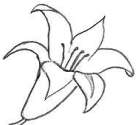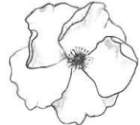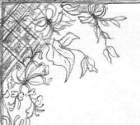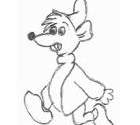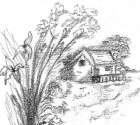Search for images or info
Sketches Of Roses
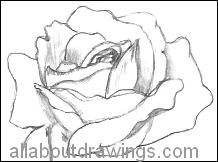
When creating sketches of roses, the aim is to capture the character and beautiful lines of this bloom.
In my view, this isn't an easy subject to draw because I am still in the early stages of artful practice.
There is no harm done if you want to attempt drawing a rose but please be aware that you might become frustrated with the intricateness of the petals.
It takes patience and practice to create good rose sketches, so before you start, make sure you're confident enough to take on the challenge!
It does help to remember that most roses have 5 petals in each layer.
There are lots of ways to master a realistic rose drawing and by trial and error, you will find a method that suits your style.
Luckily for us there are no rules in art! You are sketching this rose for you, so you are free to use your inner vision.
Inner vision is your unconscious impressions, it reflects images in your mind. So, think of it like looking at a reflection in the water which is not quite the real thing.
Outer vision relies on what is truly there.
So, while doing sketches, you are combining observation and imaginings. Isn't the practice of drawing a beautiful thing?
Don't Be Afraid To Copy
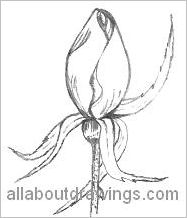
I copied this rosebud from a gardening book. I'm not sure I've captured the correct shape of the bud but I'm happy with the sketch.
I used photocopy paper (it copes with a fair amount of abuse from my eraser), and I used a 2B a mechanical pencil.
Before you commence your sketches of roses, you might find it helpful to draw a border on your paper first.
If you are copying from a picture, you can measure the pictured rose with your pencil and make tiny marks on your paper for the size of the petals or for the size of the whole rose.
It's up to you and how much confidence you have in copying it true to its form.
I use pictures only as a guide - my sketches of roses are not exact copies of my reference pictures. I like it that way, it makes me feel like I've had some input into the creation.
If you see imperfections in your drawings, that's ok because it is your inner vision showing itself!
With line drawings, every artist eventually finds a method to suit their own personality. In time, this method becomes a characteristic of your drawings - in the same way that people recognize your handwriting.
Adding Shadows And Highlights
In the image below, I started sketching from the center and worked my way out from there.
I used lines for shading, rather than subtle smudging.
Categories
Sketches
Instruction
Freebies
Other Areas
** Disclaimer: I receive a small commission if you buy via my links -- at no extra cost to you. **
The How To Sketch Guide
Here's a book that finally dispels the mystery of sketching!
... it only takes a little instruction
or guidance... Read more >>
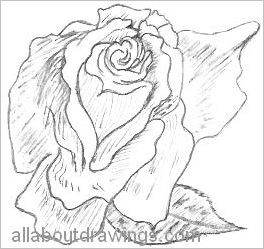
When you sketch quickly, there is no time for perfection so just use lines to depict shadow.
Shadows and highlights are effects that you use to make an image appear more realistic.
You can see in the first rose sketch at the top of page that I have lightly colored the shaded areas and then I used a cotton tip to give it a smooth impression.
One thing I struggle with is the ability to quickly capture a subject in sketching fashion. I tend to fiddle and fuss and it ends up to be a drawing! It's all a work in progress so I know to wait patiently for my sketching style to evolve.
One of the benefits of learning to draw is your new ability to notice different aspects of your chosen subject for the first time. Prior to my drawing days, I don't think I ever took the time to notice the shadows under each rose petal.
A good way to isolate more prominent shadow is to squint your eyes as you look at a picture. You only add these effects into your sketch after you have established a good outline. The outline is your solid foundation and you can work details in later.
Sometimes, I start my drawing with the outer perimeter, like I did in these rose pencil drawings. It doesn't matter which way you prefer to do it, just so long as you get the results you want. It's only a matter of experimenting until you find the best way to sketch a rose.
Also see my favorite drawings of roses that I drew one year ago.
Drawing And Sketching
The difference between drawing and sketching is simply the time you take to do one or the other. A drawing takes a good amount of time and care. A sketch is meant to quickly capture a subject.
Generally, as soon as I finish a sketch, I scan it so I can show it to you. To enable a good scanned image, I go over my sketches of roses to make them darker, so they will display properly. When I go over my lines, I tend to tidy up the sketch! That's not a good thing to do because I lose something in the transition.
Here you can see how to do simple sketches of roses, I think this shows you how to get the perception of a rose.
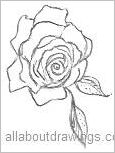
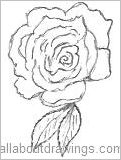
I saw images similar to these in a Barrington Barber drawing book.
He is one of my favorite artists, I love his style and the way he portrays his subjects.
These sketches of roses aren't quite the same as his but they took barely a minute to form.
Try copying them and see what results you get.
After doing these quick sketches, I was inspired to create a step by step process on how to create a rose.
When you are sketching, you only need to suggest the line of natural form.
By using these ideas for sketches of roses, you should be able to come up with a method that suits you. You only need to enjoy yourself and your creations.
Click a link below to view various flower illustrations:
There's more for you to enjoy...
* Allaboutdrawings.com is a participant in the Amazon Services LLC Associates Program, an affiliate advertising program designed to provide a means for sites to earn advertising fees by advertising and linking to Amazon.com.
Copyright © 2005 - 2025 www.allaboutdrawings.com. All rights reserved.








